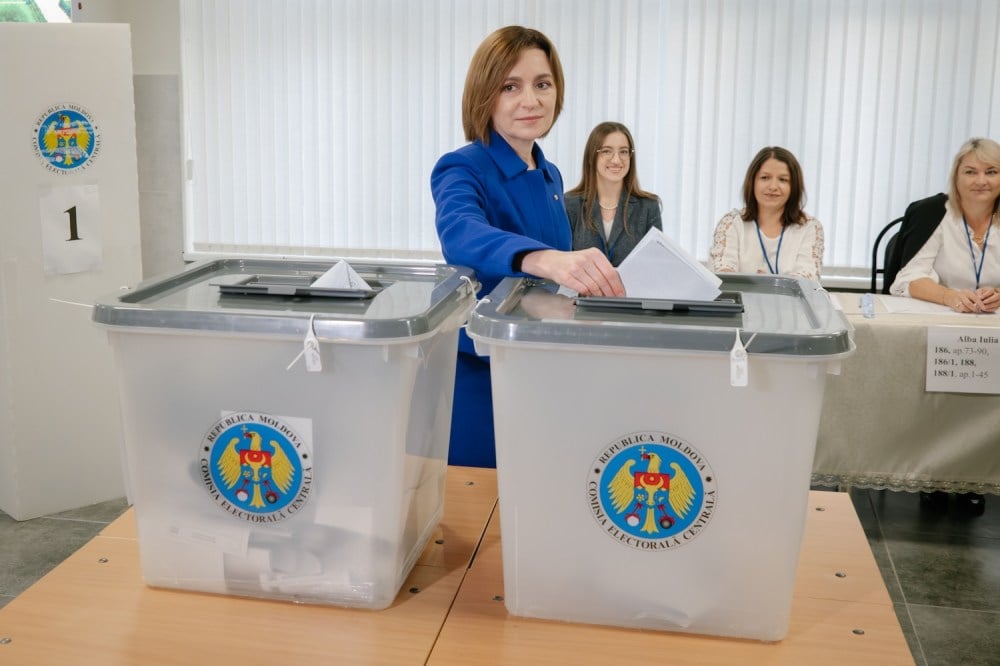Moldova’s pro-Western governing party gained a clear parliamentary majority in this weekend’s elections, choosing European alignment amid “unprecedented pressure, disinformation, and interference from the Kremlin.” Although the results advance Moldova’s EU integration path and deliver a short-term blow to Russian President Vladimir Putin’s hybrid warfare, the struggle is not over.
Moldova has become a geopolitical battleground between Russia and the West, and Putin will continue his efforts to influence it. As former British Prime Minister Winston Churchill might say, when it comes to Russia’s latest chapter of meddling, Moldova’s election is “only the end of the beginning.”
Moldova’s pro-Western governing party gained a clear parliamentary majority in this weekend’s elections, choosing European alignment amid “unprecedented pressure, disinformation, and interference from the Kremlin.” Although the results advance Moldova’s EU integration path and deliver a short-term blow to Russian President Vladimir Putin’s hybrid warfare, the struggle is not over.
Moldova has become a geopolitical battleground between Russia and the West, and Putin will continue his efforts to influence it. As former British Prime Minister Winston Churchill might say, when it comes to Russia’s latest chapter of meddling, Moldova’s election is “only the end of the beginning.”
European support was crucial in helping Moldova hold free and fair elections in the face of Russian interference. But it’s too soon to grow complacent. European leaders can do more to support Moldova’s European integration: support Moldovan investigations into Russian illicit financings, fund a more resilient Moldovan power grid, and ultimately offer Moldova a faster path to EU accession.
The pro-EU Party of Action and Solidarity (PAS) secured 50.1 percent of the vote and a parliamentary majority, defeating the pro-Russian Patriotic Electoral Bloc that captured 24.2 percent. The Russia-friendly Alternative was third, followed by the populist Our Party. However, their fight for democracy did not come easily. As PAS party leader Igor Grosu put it, Russia “threw into battle everything it had that was most vile—mountains of money, mountains of lies, mountains of illegalities.” He also accused Moscow of using “criminals to try to turn our entire country into a haven for crime.” Russia’s interference included reports of bomb scares, cyberattacks on electoral systems, and false claims by Russia’s Foreign Intelligence Service that NATO plans to invade Moldova to make it “a military testing ground.” Russian intelligence services have also reportedly been training Moldovans in Serbia to conduct destabilization and provocation measures.
In the weeks leading up to the election, Moldova’s president, Maia Sandu, and others warned that Russia was spending “hundreds of millions of euros” to influence the elections, using Russian Orthodox priests alongside the “Matryoshka” bot network. Russian influence operations took advantage of Moldova’s large Russian-speaking population, exploiting Gagauzia, a historically pro-Russian region in southern Moldova that is already at odds with Sandu’s administration.
Russia’s efforts to replace the current pro-Western parliament mirrored its meddling last fall, where the Moldovan presidential elections were subject to what the U.S. State Department called “an unprecedented level of Kremlin interference.” Moldovan police accused pro-Russian oligarch Ilan Shor of running a vote-buying scheme, reportedly distributing as much as $39 million to about 138,000 voters (Moldova’s population is under 2.5 million people).
Russia has denied election meddling but accused Moldova of an insufficient amount of polling stations, depriving “hundreds of thousands” of Moldovans of the opportunity to vote. Pro-Kremlin Moldovan and Russian officials are accusing Moldovan authorities of election fraud. Sergei Shoigu, a close Putin ally and secretary of Russia’s Security Council, described the elections as a fight to prevent “the authorities’ efforts to effectively destroy Moldovan statehood.”
Moscow also wants to prevent Moldova from joining the European Union. After Russia’s invasion of Ukraine in 2022, the EU officially granted Moldova candidate status for membership. It is “precisely because we have advanced greatly on this path, Russia has unleashed its full arsenal of hybrid attacks against us,” Sandu told a meeting of the European Parliament on Sept. 9.
This time Moscow’s election interference failed, largely because of Moldova’s model proactive defense strategy. The EU sent members of its Hybrid Rapid Response Team to help on the ground and authorized its Cybersecurity Reserve to assist in dealing with cybersecurity incidents. The resilience of the electoral system was also bolstered by years of U.S. and EU cyber and election security assistance.
However, the EU is not out of the woods yet. For its own protection and the good of the people of Moldova, the EU should continue its efforts to counter Russia’s malicious interference. The European Parliament has resolved to bolster resources for Moldova’s resilience vis-à-vis Russian “hybrid threats and malign interference.” This is a step in the right direction.
It would be even more effective for the EU to conduct its own information operations—broadcasting the truth about Russia’s malicious activities—and put Moscow on the defensive. Additionally, Brussels should provide legal and technical assistance to Moldovan authorities investigating illicit financial flows between Russia and pro-Russian parties in Moldova.
In September, the United States approved a $130 million project to build a high-voltage transmission line in Moldova. This will strengthen the country’s power grid, helping it transition from a dependence on Russian gas to a steady supply of electricity from Europe. This is a smart investment and the EU should continue to provide similar financial support to boost Moldova’s energy security.
Finally, Brussels should give Moldovan voters what they were seeking in electing pro-democracy politicians—a fast track into the EU. This would be the ultimate rebuke to Putin’s meddling.
European Commission President Ursula von der Leyen congratulated Moldova for choosing “Europe. Democracy. Freedom.” However, Putin is searching for new opportunities to challenge the West, and his plans for Moldova include Russia. Authoritarianism. Enslavement. Brussels should pay attention to Moldova, otherwise Putin’s hybrid war there could further destabilize an already-strained Europe.
